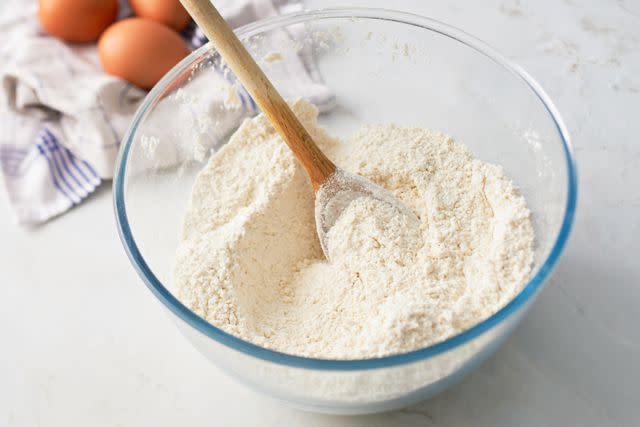King Arthur vs. Gold Medal Flour: Which Should You Buy?
There is one major difference between them.

Simply Recipes / Getty Images
With flour varieties available to match just about any baked good, you could quickly find yourself running out of space (and money) to stock them all. That’s why all-purpose flour is so popular; its versatility makes it perfect for everything from pie crusts to cakes and even breads.
Though King Arthur Baking Company and Gold Medal Flour are among Simply Recipe’s favorite brands to cook with, I asked pro bakers to break down the differences so you can choose the best option for your baking needs.
Are King Arthur & Gold Medal All-Purpose Flour the Same Flours?
King Arthur Baking Company is known as the first American flour company. It got its start as Henry Wood & Company in 1790. Gold Medal Flour entered the milling business roughly 70 years later. Each brand has a long and venerable history of making flour.
Both start with top-grade wheat, which is subject to a multi-step process, including grading, milling, and sifting, before rigorous testing of the results. The main difference lies in the type of wheat each uses, which affects the protein content of the final products.
King Arthur All-Purpose Flour is milled from hard red wheat flour, along with a small amount of malted barley flour, which contains the enzymes that improve yeast performance. Its flour contains 11.7% protein.
Gold Medal All-Purpose Flour mills a blend of hard and soft wheat flour, malted barley flour, and added vitamins. Its flour has a slightly lower protein content—around 10.5%— than King Arthur’s.
One thing that makes King Arthur stand out is its consistency. “Their internal specs [allow for a protein content variance of .1 (in extreme weather years, they may go to .2) on either side of 11.7%,” says chef Susan Reid, who has spent over 20 years in the King Arthur test kitchen as a recipe developer.
Flours from brands with wider allowable variances may differ in protein content from one bag to the next, potentially affecting the results of your baking.
Why Protein Content Matters
You can think of protein as the building blocks of gluten. When liquids, like water or milk, interact with the protein in the flour, they bond and create gluten. The more you mix or knead the batter or dough, the more bonds will be created. And it's gluten, for the most part—hydration and proofing also play a role—that gives baked goods structure and elasticity (think texture and the ability to bounce back when compressed).
As an example, if you compare a loaf of bread made with all-purpose flour to one made with gluten-free flour, you'll notice the latter will typically be denser—as will most low-protein baked goods.

Simply Recipes / Getty Images
Can King Arthur & Gold Medal All-Purpose Flour Be Used Interchangeably?
According to experts, King Arthur and Gold Medal flours are both suitable for a wide variety of baking applications and can generally be used interchangeably. “[All-purpose flour] is like a middleman flour. It has enough protein content to develop a strong gluten in making bread doughs and a low enough protein content to make moist breads, cookies, pastries, etc.,” says Samantha Gosper, Pastry Supervisor at Hope & Grand Events.
King Arthur is a better option for making bread, where you want more protein. You might think bread flour, which has even higher protein content, is the only way to achieve the perfect crumb, but Adrian Hale, baker and blogger at Thousand Bites of Bread, says that’s not always the case.
“Most bread flours have a protein content of 13% to 14%, and protein, in general, is what forms gluten. Therefore, it is slightly easier to get a springy loaf with bread flour. That said, sometimes bread flour can make a bread very chewy. When that's the desired texture, perfect! But sometimes bakers want a cross between chewy and tender, and for that, I would choose a mid-range protein content.” In other words, if you want less chew to your bread, go with an all-purpose flour like King Arthur’s.
The Takeaway
While King Arthur and Gold Medal all-purpose flours are both versatile enough to use in baked goods, from cakes to breads, you’ll want to keep in mind that the protein content between the two can differ as much as 2%, dramatically affecting the outcome of your baking.
When making softer baked goods like cakes and pastries, an all-purpose flour with a lower protein content like Gold Medal is a good choice. For denser bakes like loaves and cookies, consider reaching for King Arthur—its higher protein content helps to develop structure and achieve a chewy texture.


